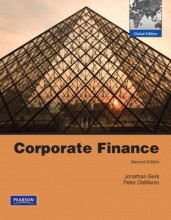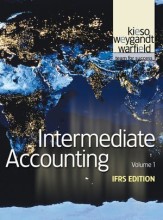Summary: Corporate Finance | 9780273756033 | Jonathan Berk, et al
- This + 400k other summaries
- A unique study and practice tool
- Never study anything twice again
- Get the grades you hope for
- 100% sure, 100% understanding
Read the summary and the most important questions on Corporate finance | 9780273756033 | Jonathan Berk, Peter DeMarzo
-
1 1 The corporation
-
1.1 The Four Types of Firms
This is a preview. There are 8 more flashcards available for chapter 1.1
Show more cards here -
What are the differences between a limited liability company and a limited partnership?
- There is no limitation on the amount of shares that one owns in a limited liability company.
- It doesn't matter who owns the shares of a limited liability company
- In case of publicly trades shares, one can raise a substancial amount of capital because they can sell the ownership shares to anonymous outside investors.
-
1.2 Ownership Versus Control of Corporations
This is a preview. There are 3 more flashcards available for chapter 1.2
Show more cards here -
What are the three main tasks of a financial manager?
- Making investment decisions (which investments are worth investing in?)
- Making financing decisions (how to pay for the investments?)
- Managing the firms cash flows (has the company enough cash in hand to meet its day-to-day obligations?)
-
What is a hostile takeover and how does it work?
A hostile takeover is when an individual or organization can purchase a large fraction of the equity and acquire enough votes to replace the board and the CEO for a new superior management team. It can happen due to a drop of the share price.
-
14 Capital structure in a perfect market
This is a preview. There are 4 more flashcards available for chapter 14
Show more cards here -
14.1 Equity Versus Debt Financing.
This is a preview. There are 3 more flashcards available for chapter 14.1
Show more cards here -
Why are the value and cash flows of levered equity less than if the firm had issued unlevered equity?
The cash flows and value of levered equity are smaller than those of unlevered equity because debt payments must be made before an payments are made to equity holders. -
How does the risk and cost of capital of levered equity compare to that of unlevered equity? Which is the superior capital structure choice in a perfect capital market?
The risk and the cost of capital of levered equity are higher than those of unlevered equity even when there is no risk that the firm will default. In a perfect market, equity financing and debt financing are equal because the total value of the firm is not affected by its choice of capital structure. -
14.2 Modigliani Miller I: Leverage, Arbitrage, and Firm Value.
This is a preview. There are 5 more flashcards available for chapter 14.2
Show more cards here -
Why are investors indifferent to the firm's capital structure choice?
As long as the firm's choice of securities does not change the cash flows generated by its assets, this decision will not change the total value of the firm or the amount of capital it can raise. Further, investor's can create whatever capital structure they want by using homemade leverage to adjust the firm's capital structure. -
What is a market value balance sheet?
A market value balance sheet is similar to an accounting balance sheet, with two important distinctions.- All assets and liabilities in the firm are included - even intangible assets such as reputation, brand name, or human capital that are missing from a standard accounting balance sheet.
- All values are current market values rather than historical costs.
-
In a perfect capital market, how will a firm's market capitalization change if it borrows in order to repurchase shares? How will its share price change?
The total value of the equity will decrease by the amount of stock that is repurchased, but the value per share will remain the same. -
Which conditions hold in a market that is a perfect capital market?
- Investors and firms can trade the same set of securities at competitive market prices equal to the present value of their future cash flows.
- There are no taxes, transaction costs, or issuance costs associated with security trading.
- A firm's financing decisions do not change the cash flows generated by its investments nor do they reveal new information about them.
-
When is homemade leverage a perfect substitute for the use of leverage by the firm?
When investors can borrow or lend at the same interest rate as the firm.
- Higher grades + faster learning
- Never study anything twice
- 100% sure, 100% understanding































